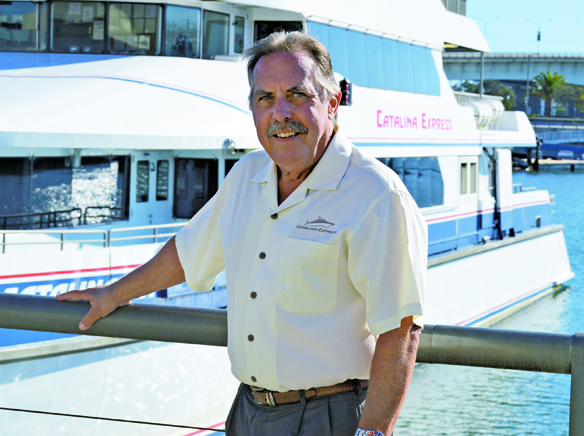
Without funding, vital link to island could be threatened
Owners of the Catalina Channel Express, the island’s most vital transportation route connecting itself to the mainland, said this week that pending regulations being imposed by the California Air Resources Board could force drastic price increases and perhaps even threaten their operational stability.
“We all knew that there had to be some changes coming,” said Greg Bombard, president of the Catalina Express. “We’ve been going through this for twenty plus years,” he said in an interview this week.
And while Bombard said he understands, and supports the environmental goals of the rule changes, implementing them without financing mechanisms could be detrimental to harbor craft throughout the region, especially his passenger ferries.
According to the CARB website, “the Commercial Harbor Craft (CHC) Regulation was adopted in 2007 to reduce emissions of diesel particulate matter (PM), oxides of nitrogen (NOx), and Reactive Organic Gases (ROG) from diesel engines used on CHC operated in Regulated California Waters (within 24 nautical miles of the California coast).
“The rule was then amended in 2010 and will be fully implemented by the end of 2022,” according to the agency. In essence, the new rule will require harbor craft, like the CCE fleet, to install state-of-the-art engines, so called “Tier 4 engine technology” to replace their existing diesel engines.
“Catalina Channel Express plays a vital role in the economic survival of Catalina Islanders, and as a company, CCE is deeply committed to California’s fight against climate change,” said Bombard.
“However, if new funding to help Catalina Express upgrade its fleet is not provided, the decline in ferry passenger volume will be harmful for many businesses in Avalon,” he noted.
“Back in those days, when the company started, the engines were all rated Tier 0. He said the business began four decades ago with basic engines.
He said the initial two-stroke diesel engines “did put out a lot of exhaust.”
Since then, however, industry officials have been working with engine manufacturers to reduce air emission, said Bombard.
Engines on the current CCE fleet have been upgraded at least twice, and, on some boats, three times, he said. On its largest passenger ferries, Bombard said it takes at least 9,000-horsespower engines to safely shuttle passengers back and forth from the island at an average of 30 plus knots (approximately 33 miles-per-hour).
In addition, he said the new Tier 4 engines, when installed, will add 15,000 pounds to the payload of the ferries. Moreover, Bombard said the new Tier 4 engines will not fit on the current engine foundations of its existing fleet.
Even if the new engines were the same size, said Bombard, their additional weight will necessitate ferries to compensate by cutting their current passenger capacity in half, in essence compelling the company to double its cross-channel trip frequency to carry the same overall volume of passengers.
And with increasing fuel prices, this alone would present a massive economic challenge.
More likely, said Bombard, to comply with the new rules the entire eight vessel fleet, including the smaller boats that provide service to places like Two Harbors, will have to be entirely rebuilt and refitted with new Tier 4 engines, he said.
When the new regulations are implemented, Bombard said other harbor craft will also be affected.
He said there are several types of harbor craft in California, including crew and supply boats, fishing vessels, ferries, excursion vessels, tugboats, barges, dredges, and other vessel types that will be affected.
To bring attention of the impending regulations to the public, Bombard said they have initiated a petition at change.org (see related story) and are urging citizens in Avalon and Two Harbors to sign it.
Avalon Mayor Anni Marshall has penned an op-ed that has appeared in several publications (see op-ed) to support the effort to put pressure on state officials to provide funding for the upgrades.
“There are other, less devastating options available to CARB that will allow the state to meet its desired environmental goals while protecting Catalina,” says Marshall in the opinion piece.
In addition to the city’s assistance, Bombard said Love Catalina and other island organizations are being supportive as they attempt to get the attention of regulators.
According to Bombard, “the past few years have created hardships for many localities, especially those made up of small businesses and tourism; Catalina is now facing yet another potential blow to its economy.”
He said they hope the change.org petition and other public outreach will send a signal to state regulators, and legislators, that the state need to think about the long-term impact before voting on the regulations. Bombard said the CARB is expected to discuss the regulations at their March meeting.
“We just hope we can get state officials to understand that along with the regulation, you need to bring funding along with it,” said Bombard. Without state financial support, the ferry service may have to privately finance the transformation of the fleet which, he said, could significantly increase cross-channel ticket prices.
“Some of the other operations are publicly funded,” said Bombard. “We’re not, we’re private, and we need to keep our pricing at a level that people can afford. So hopefully, this helps.”










